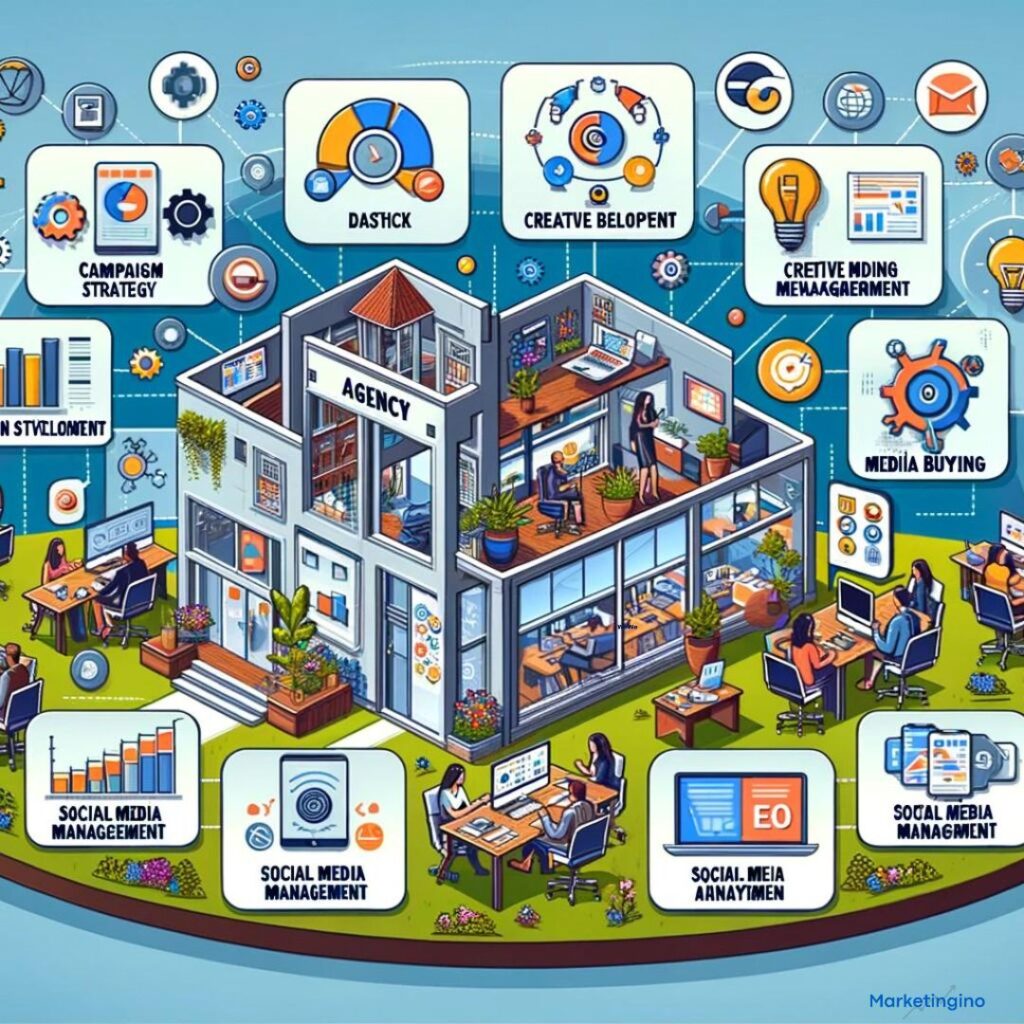An agency serves as an external partner that fulfills a company’s digital marketing and advertising needs. These agencies bring specialized expertise, creative strategies, and advanced tools to help businesses achieve their marketing goals more efficiently and effectively.
What is an Agency?
An agency is a professional service provider that offers a range of marketing and advertising services to businesses. These services can include campaign strategy, creative development, media buying, social media management, search engine optimization (SEO), pay-per-click (PPC) advertising, content creation, and more. By partnering with an agency, companies can leverage external expertise to enhance their marketing efforts and achieve better results.
Types of Agencies
- Full-Service Agencies: Full-service agencies offer a comprehensive range of marketing and advertising services. They handle everything from strategy development and creative production to media planning and performance analysis.
- Creative Agencies: Creative agencies focus on the design and production of marketing materials, including graphics, videos, copywriting, and branding. They help companies develop visually appealing and engaging content.
- Media Buying Agencies: These agencies specialize in purchasing ad space across various channels, such as television, radio, digital, and print. They negotiate the best rates and placements to maximize ad visibility and impact.
- Digital Marketing Agencies: Digital marketing agencies focus on online strategies, including SEO, PPC advertising, social media marketing, email marketing, and web analytics. They help businesses build a strong online presence.
- Social Media Agencies: Social media agencies manage a company’s social media accounts, create content, run ads, and engage with followers to build a robust social media presence.
- SEO Agencies: SEO agencies specialize in optimizing websites to improve their ranking on search engine results pages (SERPs). They use techniques like keyword research, link building, and content optimization.
How Agencies Work
- Initial Consultation: The agency begins by understanding the client’s business goals, target audience, and current marketing challenges. This helps them develop a tailored strategy.
- Strategy Development: Based on the consultation, the agency creates a detailed marketing and advertising strategy. This includes defining objectives, identifying key performance indicators (KPIs), and outlining the tactics to be used.
- Creative Production: The agency produces creative assets, such as ads, videos, graphics, and written content, aligned with the strategy. This involves collaboration between designers, writers, and other creative professionals.
- Campaign Execution: The agency launches and manages the marketing campaigns across various channels. This includes media buying, ad placements, and ongoing monitoring of campaign performance.
- Performance Analysis: Agencies track and analyze campaign performance using analytics tools. They measure metrics like impressions, clicks, conversions, and ROI to assess the effectiveness of the campaigns.
- Optimization and Reporting: Based on the analysis, the agency makes data-driven optimizations to improve campaign performance. Regular reports are provided to the client, detailing progress and outcomes.
Benefits of Partnering with an Agency
- Expertise and Experience: Agencies bring specialized knowledge and experience across various marketing disciplines, ensuring high-quality execution of campaigns.
- Access to Advanced Tools: Agencies have access to advanced marketing tools and technologies that can enhance campaign performance and provide deeper insights.
- Creative Innovation: Agencies offer fresh perspectives and innovative ideas, helping businesses stay competitive and stand out in the market.
- Scalability: Agencies can scale their services based on the client’s needs, providing flexibility to ramp up or down depending on campaign requirements.
- Cost-Effectiveness: Partnering with an agency can be more cost-effective than maintaining an in-house team, as it eliminates the need for additional salaries, training, and overhead costs.
Challenges of Working with Agencies
Despite the benefits, working with agencies also presents challenges:
- Communication: Ensuring clear and consistent communication between the client and the agency is crucial for successful collaboration and alignment of goals.
- Alignment: The agency must fully understand the client’s brand, values, and objectives to create campaigns that resonate with the target audience.
- Dependence: Over-reliance on an agency can be risky if the partnership ends abruptly. It’s essential to maintain some internal marketing capabilities.
- Cost: While agencies can be cost-effective, the fees for their services can vary significantly. Companies must carefully manage budgets to avoid overspending.
Partnering with an agency can significantly enhance a company’s digital marketing and advertising efforts. By leveraging external expertise, creative strategies, and advanced tools, businesses can achieve better results and maximize their return on investment. As the marketing landscape continues to evolve, collaborating with an agency will remain a valuable strategy for companies seeking to stay competitive and grow their brand.




